If you get a cerebral infarction and it doesn't recur for five years, will it never recur again? What is the basis for this?
Thank you! After getting a cerebral infarction does not recur within 5 years, there will still be the probability of recurrence in the future, you only understand from the principle, then in the later stage can be better related to the treatment and prevention.
First of all, let's talk about the principle of cerebral infarction. The principle of cerebral infarction is very simple to say that it is a further form of insufficient blood supply to the brain, but it is also very complicated to say that it involves the tolerance of the nerve cells as well as the compensatory response of the internal organs of the body and other various situations.
Simply speaking, as long as the first cerebral infarction occurs in human body, it indicates that there is some problem with blood vessels, whether it is hardening of blood vessels or plaque attached to blood vessels, or the elasticity of blood vessels deteriorates, or blood clots are dislodged in other places of the body, and so on, and all these it is a series of problems. So whenever there is a 1st cerebral infarction, or whenever a lacunar cerebral infarction is detected, even if there is no clinical symptom, it is necessary to carry out relevant vascular examination at this time. The most basic examination is to do cervical vascular ultrasound and transcranial Doppler, and more further examination, this is to do cerebral angiography, head nuclear magnetic and so on.
And we must have a holistic concept, cerebral infarction indicates that the blood vessels in the head have problems, but it does not exclude the blood vessels in the heart, the blood vessels in the kidneys, the blood vessels in the liver, he may also have problems, just that he does not show clinical symptoms.
In clinical practice, you can see that many people have both brain and myocardial infarctions, which means that the overall quality of the blood vessels is relatively poor, both in the brain and in the heart. So after you understand this, you can understand that in terms of simplicity, it is imperative to pay attention to diseases of the brain and the heart, as well as diseases of other organ systems at a later stage.
Then from the complexity, why some people already have a cerebral infarction, but there is no clinical symptoms, this is the emergence of intracranial compensation, some people his intracranial compensation is very good, even if there is only one blood vessel supplying the brain, it will not appear obvious infarction phenomenon, while some people vascular compensation is very poor, even a small problem with one blood vessel, will cause a large area of cerebral infarction. This explains why the same diagnosis of cerebral infarction is made, but the clinical manifestations are opposite and the outcome is very different.
Then there is the neurological compensation, because there are nerve cells which are non-functional nerve cells or relatively weakly functioning nerve cells. But some nerve cells are very important nerve cells, that is to say, the same person located in the headquarters, some are the president and the head of state, while others are the janitor or the master who cleans the toilet. And if you have a cerebral infarction and you die as the president or the head of state, even if only one person dies, then it will produce very obvious clinical symptoms, whereas if, after your cerebral infarction, you die as all the janitors or all the toilet cleaners, then at this time it doesn't produce very obvious clinical symptoms for you itself. So if you can understand this aspect, you can also clarify why the clinical symptoms of the same cerebral infarction are very different, and the prognosis is very different.
Next, why does cerebral infarction recur? The first is age, this is a factor that everyone can not ignore, with age, the body's organs will continue to degenerate and fail blood vessels are also so, will continue to produce hardening and other manifestations, and ultimately the formation of plaque narrowing, which leads to the recurrence of cerebral infarction.
The second is the daily habits, such as smoking, drinking and overeating, do not pay attention to rest, do not pay attention to sleep, this is also in the long term will produce damage to the blood vessels, or to the nervous system damage caused by the recurrence of cerebral infarction.
The third is some long-term chronic diseases, such as hypertension, diabetes, hyperlipidemia, etc., these if not timely control, but also on the blood vessels is very big, if the long-term occurrence of this situation, but also in the late promotion of the recurrence of cerebral infarction.
The fourth is not able to correctly treat, although some people have a cerebral infarction, but actively carry out the relevant treatment, play a very good preventive role, the late only very few recurrence or is basically not recurrence, but there are people have a cerebral infarction after letting go of the matter, listen to the situation, not to do any treatment, so that in the late blood vessels gradually produce lesions, there will still be a recurrence of the relevant situation. The following are some of the reasons why people may have a recurrence of cerebral infarction
So after having a cerebral infarction, whether it's 5 years without recurrence or one year without recurrence, it's still in a state of the disease, and the lack of recurrence indicates that there may be a very rich compensatory effect formed within your body, possibly some of your previous necrotic nerve cells, which are not very important nerve cells, or it may be the case that you have gone through that one time, and you've positively improved your own state of life, and you've effectively gone on to reduce the development of the disease process. But in general age is irreversible, the degree of vascular sclerosis is irreversible, and necrotic nerve cells cannot be regenerated, so you still face this situation at a later stage.
So in these terms, it is still important to be proactive in preventing regular reviews to clarify changes in your condition.
Blessings to all of you for good health!
Feel free to like, comment, retweet, and follow me to bring you to the real world of neurosurgery (brain surgery).
This statement is incorrect and unfounded. Let's first look at the characteristics of the occurrence of cerebral infarction.
1. Cerebral infarction mainly occurs in people over 45 years old, and the incidence rate increases with age. the incidence rate of cerebral infarction in people over 75 years old is 5-8 times higher than that in people aged 45-54 years old. Therefore, the older you are, the higher the risk of cerebral infarction.
2. The risk of recurrence of cerebral infarction is very high, and the risk of recurrence of cerebral infarction is 5 times higher than the risk of recurrence of cerebral infarction in ordinary people. According to the statistics, 50% of the patients with cerebral infarction have recurrent cerebral infarction, and there are even patients who have three cerebral infarctions before and after (of course, it is rare to see more than three cerebral infarctions because it is very rare to see a patient who is still alive after three cerebral infarctions).
Therefore, after a cerebral infarction, the risk of recurrence of cerebral infarction is gradually increasing with age. This is due to the fact that our cardiovascular system is aging. On the other hand, if a cerebral infarction has occurred, it means that the patient's cardiovascular system, compared to normal people, has already had significant lesions. The current level of medical care does not have the means to completely cure these lesions, so they will always be there.
Looking at these two features, aren't you a bit pessimistic. But here I am going to give you some optimistic news.
If you have had regular preventive treatment after a brain infarction, for example, patients with high blood cholesterol have started to lose weight and take lipid-lowering drugs. Patients with high blood pressure started taking antihypertensive medication as prescribed by the doctor, and their blood pressure has been kept at a reasonable level and under better control. Patients with diabetes have good blood sugar control. Or they have adhered to medications such as aspirin, as directed by their doctor. Or have been treated for atrial fibrillation.
If it's been five years since you've had a recurrence of a brain attack with the above in mind, then it means you're still in relatively good control.
Next you should continue to follow the doctor's instructions to the letter and not take it lightly.
Before answering the question, I deliberately looked up the other answers, and found that some people even made fun of the subject, saying: people are dead, but also recurrence of what? This actually reflects that the public's understanding of cerebral infarction is lacking and there are many misconceptions!
Undeniably, clinically, most people with cerebral infarction is particularly high probability of non-death or disability, it is easy to leave sequelae, which stems from its high incidence and recurrence rate, but pay attention to one point: cerebral infarction does not mean that it is equal to death!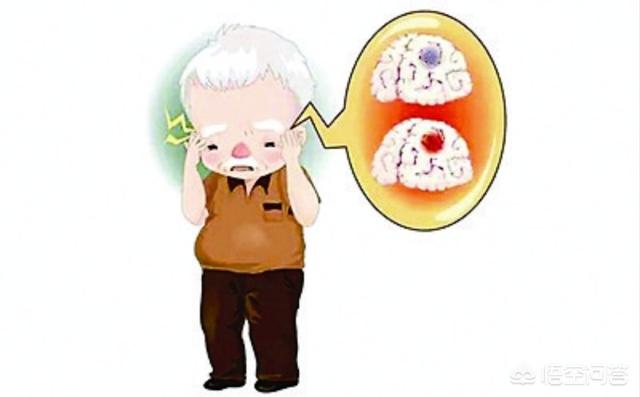
In medicine, cerebral infarction, also known as ischemic stroke, mainly refers to a kind of limited ischemic necrosis or softening of brain tissues caused by local ischemia and hypoxia due to the obstacle of blood supply to the brain. Cerebral thrombosis, lacunar infarction and cerebral embolism are the most common, and cerebral infarction accounts for 80% of all strokes.Clinically, one year after the onset of the disease, there are still residual limb weakness, crooked mouth, slurred speech and other symptoms, known as cerebral infarction sequelae, of which hemiplegia is the most common sequelae of cerebral infarction. Important point: once the sequelae of cerebral infarction occur, its functional recovery is particularly slow, and active rehabilitation treatment must be carried out, otherwise the risk of recurrence within five years is particularly high!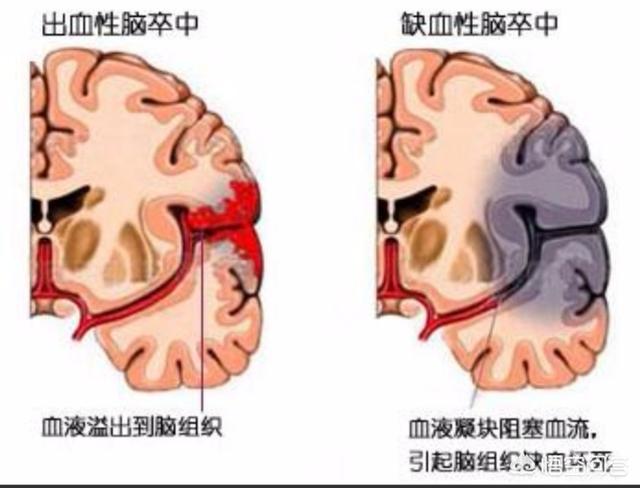
So does that mean that if it doesn't come back in five years, it must not come back in the future?
The answer is definitely: not necessarily! All that can be said is that the risk of recurrence is reduced relative to five years, but again there is definitely a recurrence rate after five years!Some studies show that the average recurrence rate of cerebral infarction patients in China within five years after discharge from the hospital is as high as more than 47%, while the United States, which has done a better job in secondary prevention, is only 10%. However, the awareness of secondary prevention in our country is not strong, and there are many patients who do not pay attention to preventive measures and rehabilitation treatment, andThe main point is that too many people like the subject have such doubts, all stemming from the lack of understanding of cerebral infarction, resulting in the recurrence rate of cerebral infarction in our country is obviously much higher!The deadliest point:Cerebral infarction is aggravated every time it recurs, and may even directly lead to the death of the patient. Therefore, preventing recurrence is the most important treatment for cerebral infarction, especially in secondary prevention!
So what are the measures to prevent cerebral infarction?
It is important to be clear: rehabilitation of cerebral infarction does not prevent recurrence, but only has a restorative effect on the function of the sequelae of cerebral infarction!It is still most important for patients to have regular reviews, take medications for prevention, and secondary prevention!
- Regular review. Not only patients with cerebral infarction, but also people of a certain age need to undergo regular medical checkups to check for ischemia in the brain and the risk of cerebral thrombosis to prevent cerebral infarction from occurring!
- Take medication for prevention. Regularly take aspirin and other drugs to prevent platelet aggregation and reduce blood viscosity; you can also take some danshen and other drugs to dilate cerebral blood vessels and increase blood flow to the brain.
- Secondary prevention. Effective control of high blood pressure and a number of conditions that are likely to cause transient ischemia of the brain; attention to and elimination of some of the triggers of stroke, such as dizziness, headache, exertion, emotional excitement, etc.; pay attention to sports and exercise, dietary structure, especially patients who have had a cerebral infarction, we should pay special attention to the psychological prevention of the patient who has been frightened for years, which may lead to a recurrence of the disease!

Hi, after a cerebral infarction, if it doesn't recur for 5 years, it won't recur in the future? The ideal is beautiful, but the reality is cruel, there is no such a statement, this idea is not right, after 5 years is also possible to recur. Let's take a look at what kind of disease is cerebral infarction?
What's a cerebral infarction?
A cerebral infarction is also called a stroke, and you may be familiar with the mention of stroke. Cerebral infarction refers to the blockage of the arteries supplying the brain, resulting in insufficient blood supply to the brain and thus ischemic necrosis of brain cells. There are two main causes of arterial blockage, one is arterial embolism, in which emboli inside the peripheral blood dislodge and block the cerebral blood vessels, and the other is atherosclerosis, which leads to narrowing and occlusion of the blood vessels.
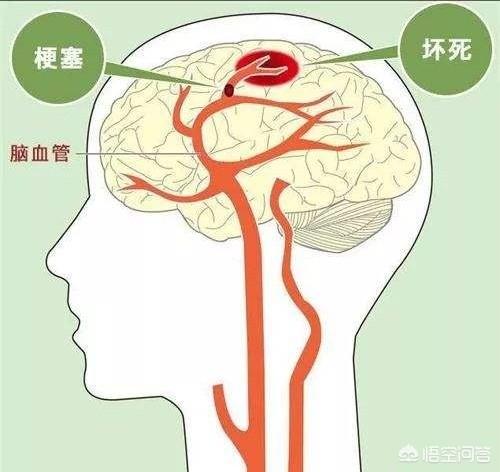
Symptoms of cerebral infarction
Patients with cerebral infarction, depending on the location of the blockage and the severity of cerebral ischemia, can experience a range of symptoms, such as sensory and motor deficits. For example, the corners of the mouth are skewed, limb weakness, vocal difficulties, dizziness, headache, vomiting, choking on water and so on. Resuscitation of cerebral infarction requires a race against time to restore the blood supply to the brain as early as possible and minimize the damage to brain cells. Therefore, doctors have invented a FAST principle, see the chart below, if these three symptoms in the chart below appear, call 120 immediately.
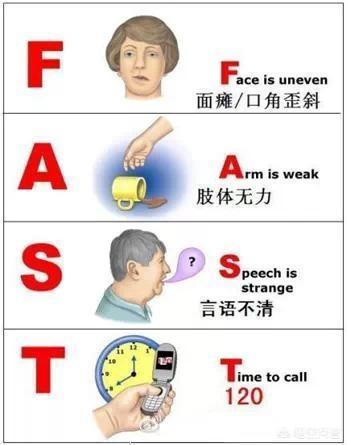
Can a brain attack recur?
Cerebral infarction is possible to recur. After the treatment of patients with cerebral infarction, the arteries may regain blood supply and reduce the probability of after-effects. However, if you do not pay attention to your body after treatment, or if you overeat every day, have a high-fat diet, and smoke and drink every day, your arteries may narrow again, leading to another cerebral infarction.
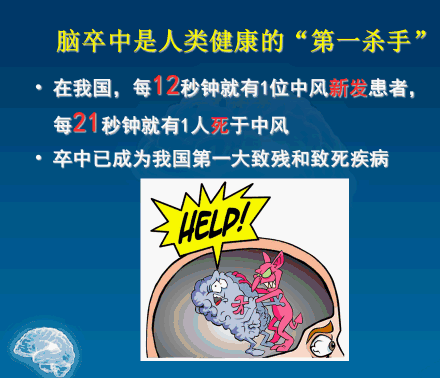
Therefore, patients with cerebral infarction need long-term follow-up after surgery, low-fat and light diet, quit smoking and drinking, control blood lipids, long-term oral lipid-lowering drugs, antiplatelet drugs, and regular review to prevent cerebral infarction from reoccurring.
Thanks for the invite!
Let's first look at what a brain infarct is:
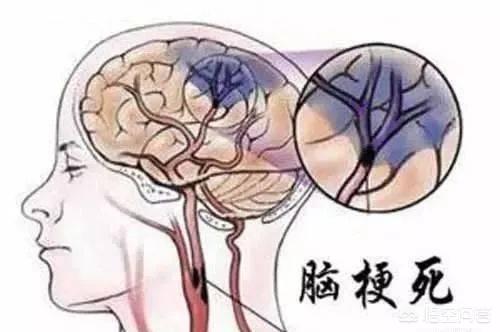
Cerebral infarction, formerly known as cerebral infarction, also known as ischemic stroke (cerebral ischemic stroke), refers to the ischemic necrosis or softening of limited brain tissue caused by ischemia and hypoxia due to the obstruction of blood supply to the brain. The common clinical types of cerebral infarction include cerebral thrombosis, lacunar infarction and cerebral embolism, etc. Cerebral infarction accounts for 80% of all strokes.
Let's translate it appropriately, cerebral infarction means that the brain tissue has been necrotic after the blood supply inside the head is not good. Then it means that if there is no timely treatment, this piece of brain tissue will not recover. If it is extensive and in the functional area of the brain, it will cause appropriate symptoms, such asslurred mouth, slurred speech, limb weakness, hemiparesis, and even impaired consciousness, to name a few.If it's small in extent and not in a functional area of the brain, then it's just lucky and may be asymptomatic。
Will it not come back after 5 years if it doesn't?
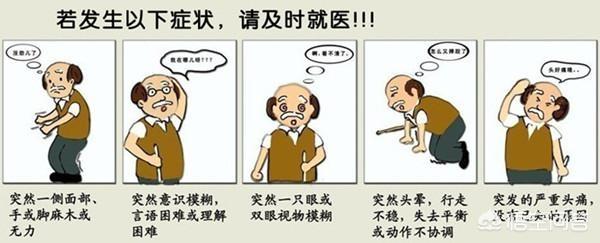
Through the above explanation, we already know that without timely treatment of cerebral infarction will not be completely recovered, then the meaning of not recurring actually means that there will be no new occurrence, but the research confirms that the risk of cerebral infarction patients reoccurring cerebral infarction is 5 times of the risk of new occurrence of cerebral infarction of the general public, therefore, for the patients after cerebral infarction, they have to do a good job in preventing cerebral infarction, rather than deluding themselves that they won't have it after 5 years of not having it. But there is no need to worry too much, because the probability of recurrence of cerebral infarction will be greatly reduced as long as prevention is done.
How can I prevent it?

1, maintain good habits: smoking and alcohol, emotional, late night and other bad habits can induce cerebral infarction, must avoid these vices.
2, avoid high salt, high fat diet: too much salt intake will cause high blood pressure, high blood pressure will damage the cardiovascular and cerebral vessels, and high fat, high calorie diet makes cholesterol, triglyceride elevation, resulting in blood vessel clogging or accelerated atherosclerosis, which will increase the risk of cerebral infarction.
3, always pay attention to climate change: changes in temperature have a very strong influence on blood pressure, so avoid cold and hot, pay attention to keep warm in winter.
4、Drugs: You can take drugs to prevent cerebral infarction under the guidance of professional doctors, such as lipid-lowering drugs, anticoagulants, antihypertensive drugs and blood-activating drugs and so on.
Hello!
First of all, it is very clear that this claim is unscientific and there is no such thing in the medical world!
The reason for this is as follows: cerebral infarction is a disease in itself along with the end of a lesion.
Its pathogenesis includes cerebral thrombosis and cerebral embolism.
Cerebral thrombosis refers to ischemic necrosis of brain tissue in the corresponding blood-supplying area of an artery due to atherosclerosis of the main trunk or tributaries of the cerebral artery, resulting in narrowing or occlusion of the lumen of the tubular lumen or the formation of a local thrombus.
Cerebral embolism refers to the blockage of a cerebral artery caused by an embolus from another part of the body entering the cerebral artery with the blood flow, resulting in ischemic necrosis of the brain tissue in the corresponding blood-supplying area of the artery.
Whether it's atherosclerosis, the reason behind the formation of cerebral blood clots, or dislodgment of emboli, which form cerebral embolisms, there is a possibility of recurrence.
The likelihood of recurrence does not get lower with time, and even gets higher with time if left unattended.
Therefore, there is no scientific basis for the statement that "if you have a cerebral infarction and it does not recur within five years, it will not recur again".
To reduce the possibility of recurrence of cerebral infarction, the correct approach is to take secondary prevention drugs for cerebral infarction on time and according to the dosage, to control risk factors such as high blood pressure, high blood lipids, and high blood sugar, to change the bad dietary habits, to exercise appropriately, to change the bad habits such as smoking and drinking, and to have a regular work and rest schedule and to maintain a calm state of mind.
If you get a cerebral infarction and it doesn't recur for five years, will it never recur again? What is the basis for this? This topic is of concern to many people, in fact, seeing this topic reminds one of many situations after tumor surgery. For many tumor patients, it is true that there is a similar situation, especially if there is nothing wrong with the tumor for five years after surgery, the chance of recurrence in the future may be reduced. So, is the same thing true for cerebral infarction? Today, Dr. Zhang will explain this question to you.
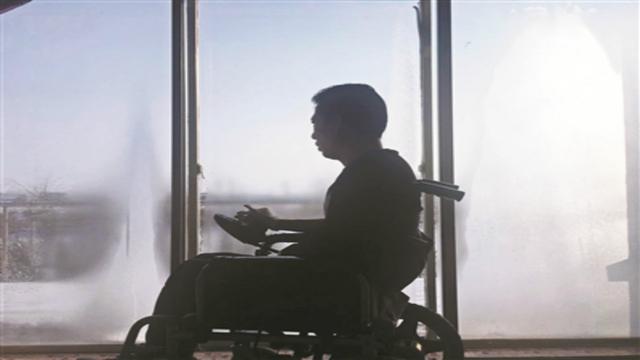
In fact, this topic may have some validity in the field of certain oncologic surgeries, especially postoperative for certain tumors, such as postoperative for breast cancer and so on. However, taking this topic to the field of cardiovascular and cerebrovascular diseases, this is not applicable. Especially in patients with cerebral infarction, generally speaking, there are many causes of cerebral infarction, such as atrial fibrillation, atherosclerotic plaques and so on. In this case, if atrial fibrillation brings cerebral infarction, it is a good thing if there is no recurrence of cerebral infarction 5 years after the onset of cerebral infarction. 5 years of no recurrence may be due to good control of atrial fibrillation, and at the same time anticoagulant therapy is done well, and down the road to continue to adhere to the effective treatment of atrial fibrillation can be effective in preventing the occurrence of cerebral infarction.
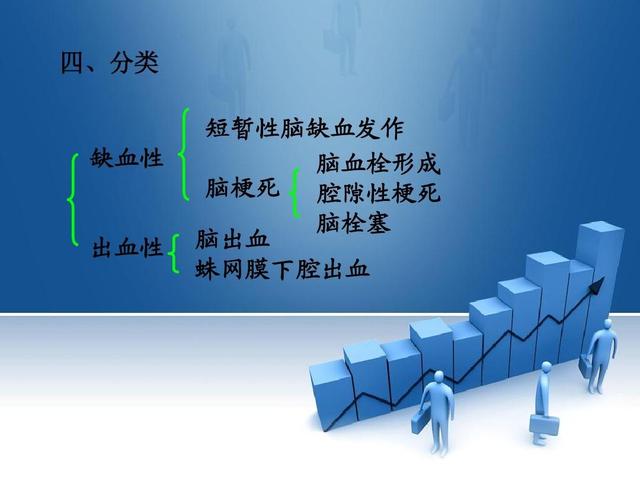
And if the cerebral infarction is caused by atherosclerosis, then 5 years without recurrence, may be because the patient regular use of aspirin, statin and other treatment of atherosclerosis cornerstone drugs, arterial plaque has been effectively controlled, so cerebral infarction for 5 years and did not have a recurrence. In that case, it would be fine for such patients to continue their original treatment regimen in the hope that the arterial plaque will not progress further and that no more serious embolic-type disease will occur.
As for the understanding that cerebral infarction will not recur if it does not recur for 5 years after the occurrence of cerebral infarction, this is obviously not the right understanding. If the cause of cerebral infarction is negligently controlled and treated, in many cases, even if there is no recurrence within 5 years, the disease may recur at any time in the later stage, or even have a recurrence of more serious diseases. Therefore, 5 years without recurrence may be because many patients do a good job in basic treatment, and for the time point of 5 years is absolutely no recurrence of this statement is not true, we must not think so. If you neglect treatment because you think that 5 years is absolutely no recurrence, that is absolutely a very terrible thing.

If you get a cerebral infarction and it doesn't recur for five years, will it never recur again? What is the basis for this?
This statement is wrong, have a cerebral infarction within five years without recurrence, can only say that a variety of high-risk factors have been controlled very well, the future will not recur does not depend on the length of time, but lies in the patient is able to actively control the various cerebral infarction triggering factors.
What is a cerebral infarction?
Cerebral infarction, which is not unfamiliar to everyone, is a common cardiovascular and cerebrovascular disease, also known as ischemic stroke, which refers to the ischemic necrosis or softening of limited brain tissues due to impaired blood supply to the brain, caused by ischemia and hypoxia. The common clinical types of cerebral infarction are cerebral thrombosis, lacunar infarction and cerebral embolism, etc. Cerebral infarction accounts for 80% of all strokes.
Clinical manifestations are mainly characterized by sudden fainting, unconsciousness, hemiplegia, speech disorders and intellectual disabilities. Cerebral infarction not only poses a great threat to human health and life, but also brings great pain and heavy burden to patients, families and society.
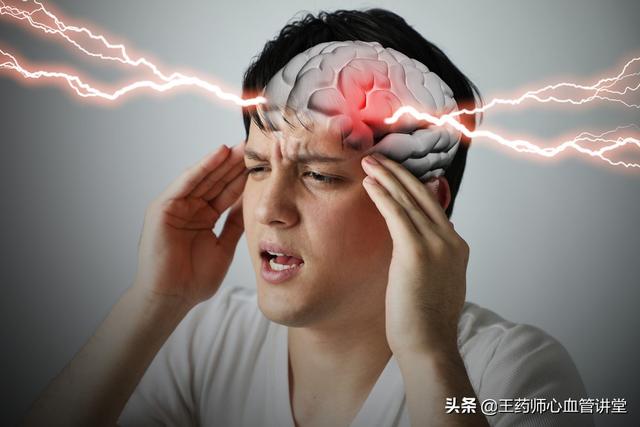
Why do brain attacks tend to recur?
Cerebral infarction is not cured, it is good, it is easy to recur twice, after the recurrence if not get timely treatment, the mortality rate is extremely high.
1. Underlying etiology remains
Diseases closely related to it include: diabetes, obesity, hypertension, rheumatic heart disease, cardiac arrhythmia, dehydration of various causes, arteritis of various kinds, shock, and too rapid and too large a drop in blood pressure. Even if cerebral infarction is cured, it is only the disappearance of its clinical symptoms, but its underlying pathology is still not cured. Therefore, even if a cerebral infarction is treated in time, it may be reviewed twice.
2. Dietary habits
The recurrence of cerebral infarction has a lot to do with dietary habits. If you are addicted to smoking, alcoholism, excessively oily food, high salt, high fat, high calorie diet and so on, these will make the blood thickening and the elevation of blood fat, which will cause the constriction of small blood vessels and lead to the recurrence of cerebral infarction again, so we must pay attention to the diet.
3. Unhealthy living habits
Cerebral infarction patients who have already had one, or high-risk groups, if they continue to be overworked, poorly rested, and emotionally harsh, they will also have blood pressure fluctuations or vascular neuromodulation disorders, in which case, it will also trigger a second attack of cerebral infarction.

4. Effects of drugs
Finally, drugs such as antihypertensives can also trigger cerebral infarction if they are not used properly.
How to prevent recurrence of cerebral infarction?
1. Take your medication on time, never stop or increase the use of antihypertensive drugs on your own, control your blood pressure, blood lipids and blood sugar, test your blood pressure and blood sugar regularly, and have regular medical checkups.
2. Reasonable diet, light diet, eat less high-fat food, eat more fruits and vegetables.
3. Reasonable exercise, those obese people are more prone to brain infarction, we can promote blood circulation through exercise, supplying the brain with enough oxygen, blood and nutrients, can reduce the recurrence rate of brain infarction by 20%.
4. Develop good living habits, quit smoking and drinking, regular work and rest, do not stay up all night, and maintain a calm state of mind.
I am Pharmacist Wang, dedicated to helping you manage your body by explaining complex and difficult disease knowledge in plain words. Your praise is my greatest motivation! Also, if you have family members who are also suffering from recurrent brain attacks, please pass this article on to them!
It's never been said that way!
The simplest of truths, even if you don't know anything about medicine, you know it's nonsense.
When you have a cerebral infarction, if you don't pay attention to it, then the possibility of recurrence is very high.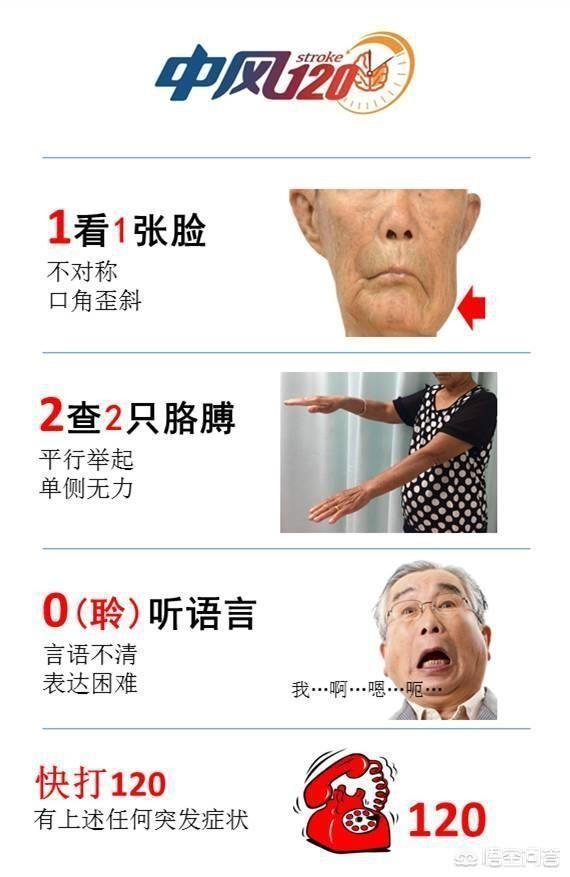
How can we pay attention and reduce the recurrence of cerebral infarction?
First, medication must be taken regularly.For cerebral infarction caused by atherosclerosis, aspirin plus statin is the basic medication and the one that clearly prevents cerebral infarction, so it must be taken, but it must also be monitored for side effects.
Second, control and monitor the three highs, as they are the most important cause of cerebral infarction。
Thirdly, for cerebral infarction caused by atrial fibrillation, anticoagulation must be performedFor treatment, take warfarin or dabigatran, or rivaroxaban. It's not aspirin. Remember, not all cerebral infarctions require aspirin. 20% of cerebral infarctions caused by atrial fibrillation are anticoagulated, not antiplatelet.
Fourth, healthy lifestyles
Stop smoking and drinking, both smoking and drinking significantly increase the risk of cerebral infarction.
Eat a healthy diet, low salt, low fat and low sugar, plant-based foods, reduce high-fat, high-calorie, high-oil foods, and poultry-based meats.
Definitely move more if you can, add external massage if you can't, etc.
Fifthly, to pass the psychological barrier
On the one hand the family has to get over the psychological hurdle of treating the patient not as they used to, but with more attention and love.
On the other hand, the patient himself will have a big psychological gap and must be encouraged.
If you do a little bit of everything this way, you will be more effective in preventing another cerebral infarction. Instead of waiting sparingly for five years to never have another cerebral infarction.
(Dr. Cardiovascular Wang officially authorized original protection, such as theft must be held legally responsible.)
谢邀.
There is no basis for this claim, and cerebral infarctions can recur at any time.
Cerebral infarction (CI), also known as ischemic stroke, is defined as limited ischemic necrosis or softening of brain tissue caused by impaired cerebral blood supply, ischemia, and hypoxia. Common clinical types include arterial thrombotic cerebral infarction, cerebral embolism, and lacunar cerebral infarction. Among them, cerebral infarction accounts for about 70%-80% of all strokes.
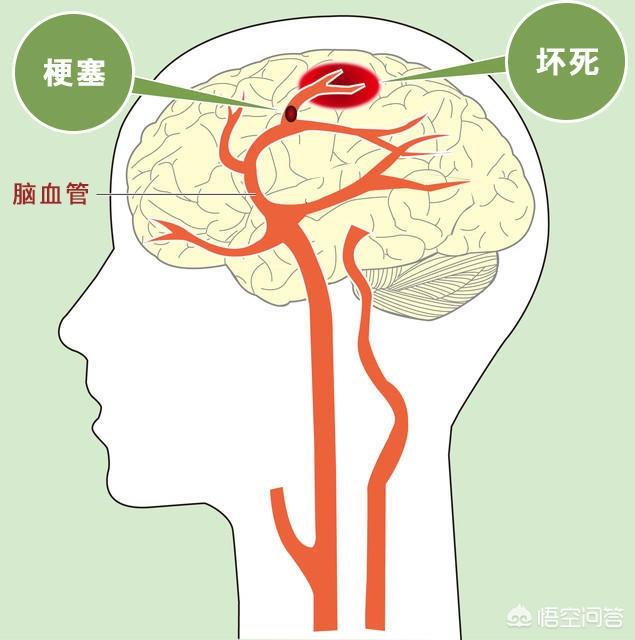
The pathogenesis of cerebral infarction generally refers to the narrowing or occlusion of the lumen of the main stem or cortical branches of cerebral arteries and the formation of thrombus, or embolus from various parts of the body entering the cerebral arteries along with the blood flow to cause cerebral arterial obstruction, resulting in ischemic necrosis of brain tissues in the corresponding arterial blood supply area. There are also ischemic microinfarct foci in the deep part of the brain and brainstem, which can form lacunar infarcts after removal by phagocytes.
Therefore, cerebral infarction is not something that won't recur within five years after you get it. Moreover, the recurrence rate of cerebral infarction is as high as 80%, so it is necessary to do a good job of secondary prevention and daily lifestyle changes. Therefore, patients who have had a cerebral infarction or older patients need to pay attention.

1, take prophylactic medication aspirin, atorvastatin calcium and other drugs on time, and control blood pressure, blood glucose, blood lipids, and regular review of biochemistry and other tests.
2, Rehabilitation therapy, early rehabilitation exercise, can improve the patient's limb function, prevent bedsores, respiratory and urinary infections, deep vein thrombosis and joint contractures and other complications.
3, healthy diet, patients need to low-salt, low-fat diet, do not eat too much fat, sweet, thick and greasy, as far as possible to maintain blood lipids, cholesterol at a normal level, to reduce the risk of atherosclerosis.
4, avoid wind and cold, when the climate becomes cold, blood vessel contraction is often easy to cause cerebrovascular obstruction and thus stroke, so the elderly need to pay special attention to cold and warmth.
5, maintain a good, calm state of mind, do not be impatient, angry, angry, these conditions will lead to increased blood pressure, blood vessel blockage or bleeding, so it is vital to have a good state of mind. As the saying goes: "A smile is worth ten years".

Therefore, patients who have had a cerebral infarction should not be careless, and rehabilitation needs to be carried out throughout life, because cerebrovascular disease is everywhere and may recur at any time, which should not be ignored.
I am Dr. Lee from the Rehabilitation Department. Stay away from sub-health and enjoy a healthy life.
This question and answer are from the site users, does not represent the position of the site, such as infringement, please contact the administrator to delete.